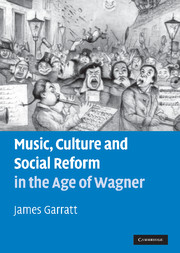Book contents
- Frontmatter
- Contents
- Acknowledgments
- Abbreviations
- Introduction
- 1 Liberalism, autonomy and the social functions of art
- 2 Radical and social aesthetics in the Vormärz
- 3 Speaking for the Volk: music, politics and Vormärz festivals
- 4 Revolutionary voices: blueprints for an aesthetic state
- 5 Music and the politics of post-revolutionary culture
- 6 The song of the workers: idylls and activism
- Notes
- Bibliography
- Index
1 - Liberalism, autonomy and the social functions of art
Published online by Cambridge University Press: 05 July 2011
- Frontmatter
- Contents
- Acknowledgments
- Abbreviations
- Introduction
- 1 Liberalism, autonomy and the social functions of art
- 2 Radical and social aesthetics in the Vormärz
- 3 Speaking for the Volk: music, politics and Vormärz festivals
- 4 Revolutionary voices: blueprints for an aesthetic state
- 5 Music and the politics of post-revolutionary culture
- 6 The song of the workers: idylls and activism
- Notes
- Bibliography
- Index
Summary
The musical culture and discourse of nineteenth-century Germany has often been viewed through the lens of an all-pervading binary: the distinction between autonomous high art and functional low art, or between a music conceived from the standpoint of aesthetic autonomy and that viewed in instrumental or operative terms. This perspective, at once reductive and constraining, drastically impedes our understanding of the social and political roles of music in this period, casting the aesthetic and socio-political spheres as irreconcilable opposites. This dualism, like a straitjacket, tends to strengthen itself with every turn; indeed, in recent decades – as scholars endeavoured to purge such aestheticist thinking from musicology – the discipline's bad conscience was often projected onto the past, reinforcing the notion that such binaries and exclusions governed nineteenth-century musical thought and culture. The approach taken in this and the next chapter goes beyond simply revealing the self-interest and ideological manoeuvring that shaped some of the canonical aesthetic texts of the period. In showing how aesthetic and socio-political concerns were interlocked, I pursue two different strategies. One approach is to reappraise the political dimensions of aesthetic autonomy, demonstrating the ways in which variant forms of autonomy reflect different aspects of liberal ideology. Another is to construct a counter-history to it, exploring the alternative aesthetic models that coexisted with and countered autonomy from the 1790s onwards.
- Type
- Chapter
- Information
- Publisher: Cambridge University PressPrint publication year: 2010



